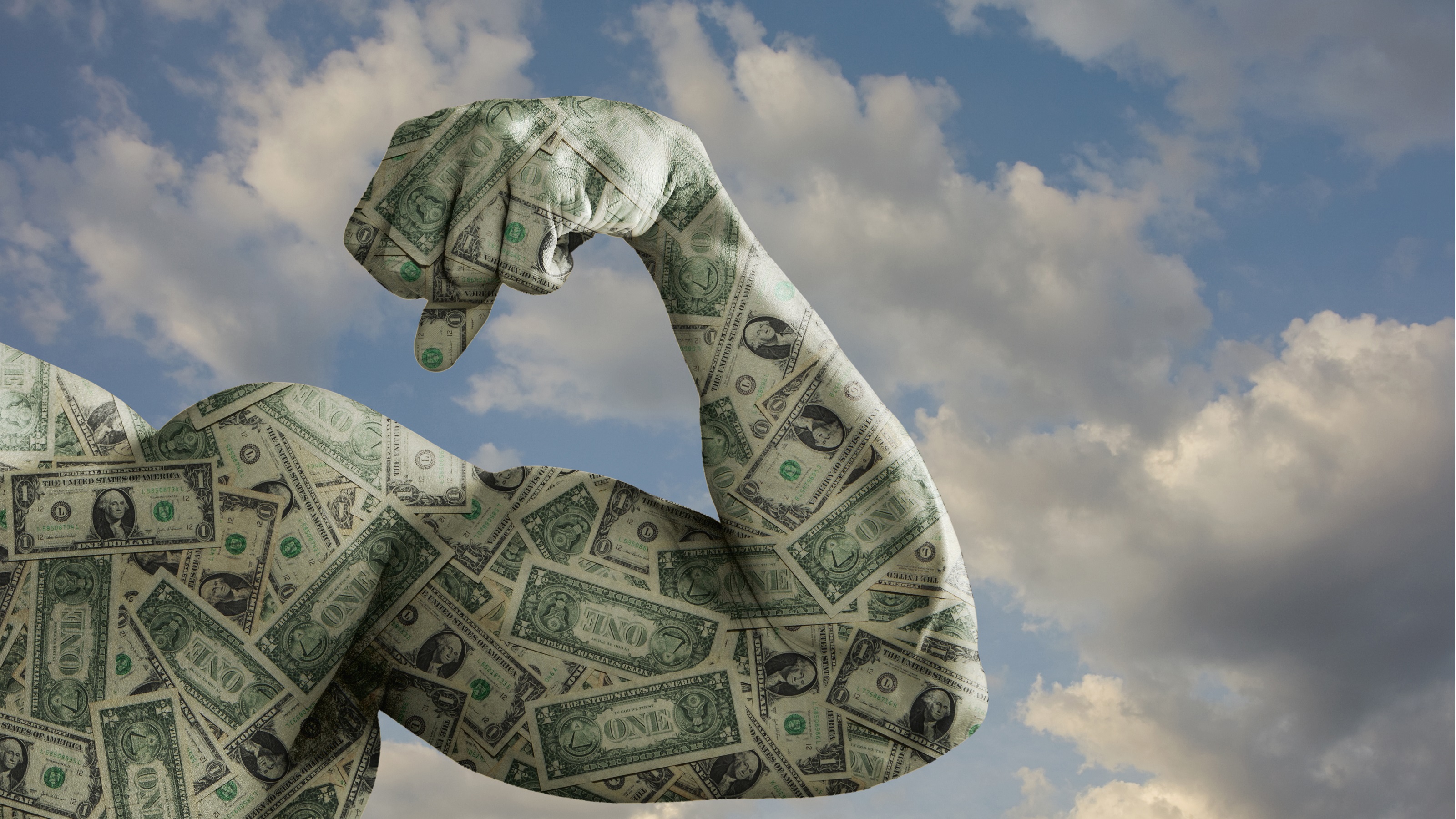Why a Strong U.S. Dollar Is Bad News for Investors
On top of higher inflation worldwide, corporate profits suffer when goods become more expensive at a time when other countries’ currencies are weaker against the U.S. dollar.


Profit and prosper with the best of Kiplinger's advice on investing, taxes, retirement, personal finance and much more. Delivered daily. Enter your email in the box and click Sign Me Up.
You are now subscribed
Your newsletter sign-up was successful
Want to add more newsletters?

Delivered daily
Kiplinger Today
Profit and prosper with the best of Kiplinger's advice on investing, taxes, retirement, personal finance and much more delivered daily. Smart money moves start here.

Sent five days a week
Kiplinger A Step Ahead
Get practical help to make better financial decisions in your everyday life, from spending to savings on top deals.

Delivered daily
Kiplinger Closing Bell
Get today's biggest financial and investing headlines delivered to your inbox every day the U.S. stock market is open.

Sent twice a week
Kiplinger Adviser Intel
Financial pros across the country share best practices and fresh tactics to preserve and grow your wealth.

Delivered weekly
Kiplinger Tax Tips
Trim your federal and state tax bills with practical tax-planning and tax-cutting strategies.

Sent twice a week
Kiplinger Retirement Tips
Your twice-a-week guide to planning and enjoying a financially secure and richly rewarding retirement

Sent bimonthly.
Kiplinger Adviser Angle
Insights for advisers, wealth managers and other financial professionals.

Sent twice a week
Kiplinger Investing Weekly
Your twice-a-week roundup of promising stocks, funds, companies and industries you should consider, ones you should avoid, and why.

Sent weekly for six weeks
Kiplinger Invest for Retirement
Your step-by-step six-part series on how to invest for retirement, from devising a successful strategy to exactly which investments to choose.
According to the U.S. Dollar Index, which measures the currency against a number of significant trading partners, including the euro, Japanese yen, British pound, Canadian dollar, Swedish krona and Swiss franc, the worth of the U.S. dollar has risen by nearly 9.3% during the past year. By comparison, the British pound plunged 11.2% over the past year.
"The greenback has gone ballistic," according to a Barron's piece in late September 2022, as the dollar hovered at a 20-year record high. Nearly every major currency lost value against the U.S. dollar throughout 2022 thanks to the Federal Reserve's campaign to rein in inflation with higher interest rates. The Fed is expected to continue regular rate increases into 2023.
While conventional logic would suggest a rising U.S. dollar bodes well during a period of runaway U.S. inflation, it is bad news for investors and the overall health of the American economy.
From just $107.88 $24.99 for Kiplinger Personal Finance
Become a smarter, better informed investor. Subscribe from just $107.88 $24.99, plus get up to 4 Special Issues

Sign up for Kiplinger’s Free Newsletters
Profit and prosper with the best of expert advice on investing, taxes, retirement, personal finance and more - straight to your e-mail.
Profit and prosper with the best of expert advice - straight to your e-mail.
Cons of the Strong U.S. Dollar
A strong U.S. dollar means lower costs for imported goods, which translates to less-expensive consumer items, but in the face of a record inflation and quantitative tightening, it only exacerbates the ongoing contraction on multinational corporations’ top and bottom lines. About 40% of the revenue in the S&P is international. The tech sector specifically is greater than 50%.
Troubling U.S. and Global Implications
To make matters worse, the Russian war in Ukraine coupled with the high U.S. dollar valuation is very troubling. Most commodities are priced in dollars. This makes necessities like oil and wheat more expensive, threatening the ability of some countries to access sufficient quantities of essential supplies.
The same is true of public debt. The high U.S. dollar value bumps up the cost of interest payments for foreign entities and citizens with U.S.-based loans.
And, while a stronger dollar is slowing the rate of inflation in the U.S., it is increasing the rate of inflation in much of the rest of the world. The global economy is weakening, as a result.
The situation we face is a double-edged sword. Unfortunately, there is no simple solution. Continuing inflation in the U.S. would mean higher costs for consumers. A stronger U.S. dollar helps limit inflation. Yet, a stronger dollar means less revenue coming from abroad to fuel the profits of U.S. companies.
The Strong U.S. Dollar Triggers Worldwide Inflation and Economic Risk
The dollar's surge has made difficult situations worse in the rest of the world. Central banks in other countries must raise interest rates in an effort to prop up their currencies. But the higher rates contribute to weakened economic growth and higher unemployment.
Citizens from Cairo to Istanbul to Manchester, England, and around the globe face life-changing inflation, which threatens their livelihood and ability to afford a place of residence.
Inflation makes imports to other countries more expensive, adding to their pressures. Companies, consumers and governments outside the U.S. that borrowed in dollars experience greater pressure — since more local currency is needed to convert into dollars when making loan payments.
The global economy is expected to fall into recession in 2023, due in part to the worldwide chain reactions resulting from the strong U.S. dollar.
The Strong U.S. Dollar and Investment Prospects
In a rising-dollar environment, foreign investments generally underperform.
And the price of U.S. stocks and bonds won't be as attractive to foreign investors, since they'll be more expensive when purchased with currency of lesser value. A significant subgroup of the S&P 500 are companies like Apple, Microsoft and Alphabet, which derive a substantial percentage of their revenue from overseas. These companies could experience valuation pressures as revenues subside.
Overall, the knock-on effects of an overly strong dollar environment mean price pressures for U.S. stocks. As one rises, the other drops.
But certain types of stocks typically do well when the dollar is strong. Generally, if the dollar's value increases, U.S. imports increase, while U.S. exports fall. So investing in the right industries that export to the U.S. could result in profits.
Though a strong dollar seems like a positive component of a healthy economy, globalization makes it a drag on U.S. markets and economic growth, among other perils, in this rough market environment.
Curbing inflation by raising interest rates is a necessary action, but it does upset the balance of the global economy and create a challenging situation for investors, which requires thoughtful insight.
Profit and prosper with the best of Kiplinger's advice on investing, taxes, retirement, personal finance and much more. Delivered daily. Enter your email in the box and click Sign Me Up.

Josh Sailar is an investment adviser and partner at Blue Zone Wealth Advisors, an independent registered investment adviser in Los Angeles. He specializes in constructing and managing customized advanced plans for business owners, executives and high net worth individuals. He holds the designations of Certified Financial Planner (CFP®) and Certified Plan Fiduciary Advisor (CPFA), the FINRA Series 7, 63, 65 licenses, as well as tax preparer license.
-
 Nasdaq Leads a Rocky Risk-On Rally: Stock Market Today
Nasdaq Leads a Rocky Risk-On Rally: Stock Market TodayAnother worrying bout of late-session weakness couldn't take down the main equity indexes on Wednesday.
-
 Quiz: Do You Know How to Avoid the "Medigap Trap?"
Quiz: Do You Know How to Avoid the "Medigap Trap?"Quiz Test your basic knowledge of the "Medigap Trap" in our quick quiz.
-
 5 Top Tax-Efficient Mutual Funds for Smarter Investing
5 Top Tax-Efficient Mutual Funds for Smarter InvestingMutual funds are many things, but "tax-friendly" usually isn't one of them. These are the exceptions.
-
 Social Security Break-Even Math Is Helpful, But Don't Let It Dictate When You'll File
Social Security Break-Even Math Is Helpful, But Don't Let It Dictate When You'll FileYour Social Security break-even age tells you how long you'd need to live for delaying to pay off, but shouldn't be the sole basis for deciding when to claim.
-
 I'm an Opportunity Zone Pro: This Is How to Deliver Roth-Like Tax-Free Growth (Without Contribution Limits)
I'm an Opportunity Zone Pro: This Is How to Deliver Roth-Like Tax-Free Growth (Without Contribution Limits)Investors who combine Roth IRAs, the gold standard of tax-free savings, with qualified opportunity funds could enjoy decades of tax-free growth.
-
 One of the Most Powerful Wealth-Building Moves a Woman Can Make: A Midcareer Pivot
One of the Most Powerful Wealth-Building Moves a Woman Can Make: A Midcareer PivotIf it feels like you can't sustain what you're doing for the next 20 years, it's time for an honest look at what's draining you and what energizes you.
-
 I'm a Wealth Adviser Obsessed With Mahjong: Here Are 8 Ways It Can Teach Us How to Manage Our Money
I'm a Wealth Adviser Obsessed With Mahjong: Here Are 8 Ways It Can Teach Us How to Manage Our MoneyThis increasingly popular Chinese game can teach us not only how to help manage our money but also how important it is to connect with other people.
-
 Looking for a Financial Book That Won't Put Your Young Adult to Sleep? This One Makes 'Cents'
Looking for a Financial Book That Won't Put Your Young Adult to Sleep? This One Makes 'Cents'"Wealth Your Way" by Cosmo DeStefano offers a highly accessible guide for young adults and their parents on building wealth through simple, consistent habits.
-
 Global Uncertainty Has Investors Running Scared: This Is How Advisers Can Reassure Them
Global Uncertainty Has Investors Running Scared: This Is How Advisers Can Reassure ThemHow can advisers reassure clients nervous about their plans in an increasingly complex and rapidly changing world? This conversational framework provides the key.
-
 I'm a Real Estate Investing Pro: This Is How to Use 1031 Exchanges to Scale Up Your Real Estate Empire
I'm a Real Estate Investing Pro: This Is How to Use 1031 Exchanges to Scale Up Your Real Estate EmpireSmall rental properties can be excellent investments, but you can use 1031 exchanges to transition to commercial real estate for bigger wealth-building.
-
 The 8 Stages of Retirement: An Expert Guide to Confidence, Flexibility and Fulfillment, From a Financial Planner
The 8 Stages of Retirement: An Expert Guide to Confidence, Flexibility and Fulfillment, From a Financial PlannerRetirement planning is less about hitting a "magic number" and more about an intentional journey — from understanding your relationship with money to preparing for your final legacy.